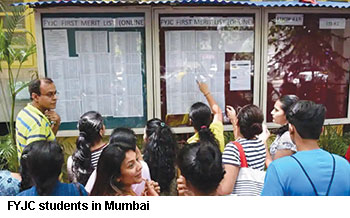 The state government’s online Centralised Admission Process (CAP), introduced a decade ago to streamline admissions into class XI/first year junior colleges (FYJCs) aka Plus Two, ended in chaos and confusion after a Nagpur bench of the Bombay high court stayed the allocation of religious and linguistic minority quota seats to the merit quota. The court ordered all religious and linguistic minority education institutions in the state to keep their minority and management quota admissions open until the state government’s centralised online admission process is completed. Minority institutions will subsequently surrender their vacant quota seats to the state’s education ministry which will conduct additional merit-based counselling for admission into class XI.
The state government’s online Centralised Admission Process (CAP), introduced a decade ago to streamline admissions into class XI/first year junior colleges (FYJCs) aka Plus Two, ended in chaos and confusion after a Nagpur bench of the Bombay high court stayed the allocation of religious and linguistic minority quota seats to the merit quota. The court ordered all religious and linguistic minority education institutions in the state to keep their minority and management quota admissions open until the state government’s centralised online admission process is completed. Minority institutions will subsequently surrender their vacant quota seats to the state’s education ministry which will conduct additional merit-based counselling for admission into class XI.
While the judgement covered all minority institutions in the state, Mumbai, which has 230,000 students — the highest in the state — registering for class XI admissions through CAP besides hosting the largest number of minority colleges (512) statewide, faced maximum impact. Even as 58,000 minority quota seats remained unfilled, 81,063 general category students were still to secure first choice admissions until August 7, when the fourth and final CAP list was published. The delay resulted in the extension of the admission process from end July to the first week of September and derailment of the academic calendars of 812 junior colleges in Mumbai.
The background of this controversy is the St. Stephen’s College vs. University of Delhi (1992) case in which the Supreme Court ruled that minority-promoted colleges, even if recipients of aid from the Central or state government, are entitled to reserve up to 50 percent of seats for students of the promoters’ religious and/or linguistic community. This judgement was upheld by the apex court in its landmark judgement in T.M.A. Pai Foundation vs. Union of India (2002) which permitted all colleges of professional education to devise their own fair and merit-based admission systems and levy reasonable tuition fees, but banned capitation fees. In conformity with the ratio decidendi in these Supreme Court judgements, the Maharashtra government (government resolution dated July 20, 2006) has been permitting minority institutions to also reserve up to 50 percent of seats for students of the promoter-minority community.
However, objecting to minority institutions surrendering their vacant minority quota seats even before the first round of CAP counseling, the Stree Shikshan Prasarak Mandal, a non-minority junior college, filed a writ petition. The petitioner contended that surrender of seats by minority colleges enlarged CAP and permitted a larger number of merit students to apply to minority FYJC colleges to the disadvantage of non-minority junior colleges. Justices Bhushan Dharmadhikari and Zaka Haq converted the writ into a public interest litigation (PIL) issue remarking, “it is apparent that the high status minority FYJCs enjoy is being compromised in the process to the prejudice of non-minority institutes”.
“Unlike non-minority colleges, colleges with minority status enjoy several exemptions. For instance, they are not obliged to reserve seats for students of the SC, ST and OBC categories. Yet, rather than admit students with very low class X board exam scores from their own community which would adversely affect their academic reputation, minority colleges often surrender a substantial percentage of their minority quota seats to CAP. Therefore, non-minority colleges are made to bear the brunt of the concessions enjoyed by minority colleges as they are obliged to reserve 49.5 percent capacity for SC, ST and OBC students, besides admitting lowest score CAP students. Hence their protest against minority FYJCs closing their minority admissions prematurely,” says a lawyer briefed on behalf of non-minority FYJCs.
With unfilled minority quota seats added back to CAP after four rounds, the education ministry held special counseling sessions offering preferred merit quota seats on a first-come-first served basis. Simultaneously, the ministry permitted FYJCs, which had completed 70 percent of their admissions, to begin classes.
“The derailment of the academic calendar due to the admissions mess will result in postponement of exams which otherwise would have been held in the first week of September,” says a spokesperson of a minority-run FYJC.
Earlier this year, undergraduate college admissions were also delayed after the state government proposed to re-introduce reservations for SC, ST and OBC students in minority-run arts, science and commerce colleges.
Admissions commenced only after the Supreme Court dismissed the state government’s special leave petition.
In the cause of enabling minority students through complex quota rules and regulations, Parliament, the courts and government have combined to create a huge mess in higher education which repeatedly disrupts academic calendars and devalues India’s higher education system.
Dipta Joshi (Mumbai)





















